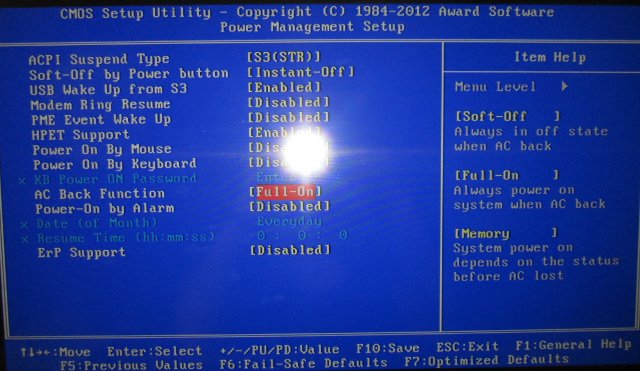I’ve decided it would be good if I could just hide the computer under the table, as I never use the DVD writer, and I can access USB ports for removable storage or debug board via a USB hub on my table. The only problem is that I would have to go under the table to press the power button each time I want to power on the computer. Feasible, but not very convenient. Every morning, I connect a power strip to the mains supply for my computer, monitor, and related equipment, so it would be good if the computer could just start when I connect it. I found out there’s an option in the BIOS of my main board to do just that. Most other people seem to use that feature to be able to automatically restart their computer after a power failure so that they can access it remotely. Some smart power strips such as PowerUSB Watchdog also need that feature to automatically restart a computer if it hangs.
In the BIOS of my motherboard (Gigabyte GA-970A-D3), I need to go to Power Management Setup, and change AC Back Function with one of three options:
- Soft-Off – This is the default setting. When the power comes back, it will always stay in power off mode until you press the power button
- Full-On – Each time the AC power is connected, the computer will automatically start. This is the setting that fulfills my needs.
- Memory – If you turn off the PC normally, and you disconnect the computer from the mains or there is a power failure when it’s off, the computer will not start automatically. If the computer was running when the power was cut, then it will start automatically.
Selecting Full-On does exactly what I need. Whenever AC power is ON, the computer will auto-run without having to press the power button.
The exact option depends on the BIOS, but I’ve read most recent motherboards should support this feature. This method is OS-independent, so it would work with Linux based distributions, Windows, MAC OS X or any other operating systems you may use.

Jean-Luc started CNX Software in 2010 as a part-time endeavor, before quitting his job as a software engineering manager, and starting to write daily news, and reviews full time later in 2011.
Support CNX Software! Donate via cryptocurrencies, become a Patron on Patreon, or purchase goods on Amazon or Aliexpress





